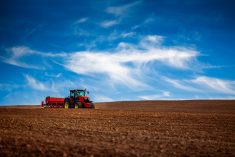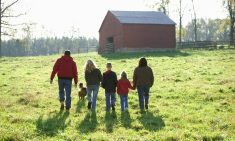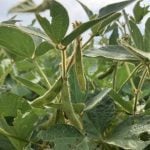The Agronomy deal U. S. co-operative Land O Lakes and farmer-owned CHS sell their shares in Agronomy Company of Canada (ACC) to La Coop fdre. The transaction includes:
ACC corporate office and grain assets in Belton (30 employees)
ACC grain and crop input subsidiary
Wellburn Agromart Limited
Part ownership in 20 Agromarts (16 in Ontario, two in New Brunswick, one in Nova Scotia and one Prince Edward Island)
Indirect ownership interests in Agromart Terminal and Agromart Processing Company
Are we better off with Americans or with French-Canadians? That’s the question they have to ask themselves, Lafleur said. At La Coop fdre, we are determined to prove that the partnership will be better with us, because they will also learn from us.
Read Also

Farmland values: assumptions and realities
Where farmland values are headed and what decisions farmers should make
The Agronomy acquisition is expected to add stability to La Coop fdre’s activities. Its pork processing and marketing (Olymel brand) division has had more downs than ups in recent years. Its farmer co-operatives, including the one in St-Isidore, in Eastern Ontario, have been steadily gaining market share, but as farmer numbers dwindle, major restructuring has become necessary to eliminate feed mills operating at a fraction of their capacity.
Significant synergy is also expected from the Agronony deal. For example, a 35,000-tonne boatload of fertilizer could be unloaded at two locations in Quebec and one in Ontario. With that added capacity, La Coop fdre buyers can easily order in a boat when a good deal comes up.
We are doubling our supply volumes, La Coop fdre president Denis Richard says. We re becoming a player big enough to influence fertilizer markets in Eastern Canada.
According to Richard, it’s not only a matter of gaining respect from crop input multinationals. It’s also about retaining the business of individual farmers, who expect competitive pricing from their co-operative, even though the co-op believes it offers more agronomic advice and customer support than other suppliers.
As a co-op, you don’t pursue acquisitions with the intent of increasing stock market share value, Richard says. Our objective is to ensure proper supply to our members.
Coop fdre executives are still on the watch for further acquisitions. In these uncertain economic times, however, any move will be done with extreme caution. We are not on a buying spree, Lafleur says.
With already close to 50 per cent of the crop input market in Quebec, it’s logical for La Coop fdre to seek growth outside of its traditional territory, Richard explains. We are now thinking Eastern Canada instead of Quebec only, he says.
But geography and language remain major obstacles for out-of-Quebec growth. A leap into Alberta, for example, would not provide infrastructure or management synergy.
With key staff at Montreal headquarters speaking French only, further expansion in Canada could be done out of Belton, Lafleur suggests. Agronony staff certainly have better knowledge of business culture in Western Canada.
Even while attending Harvard seminars and managing Quebec’s 5th largest company out of a 10th floor office overlooking Mont Royal, Richard says his values are the same as the members. They have to be, he says, and to help make sure, over the weekend he personally responds to e-mails commenting on his column in the co-op’s magazine. This emotional relationship with farmers has been going on for years, Richard says.
The Agromart deal is about partnering with people who are close to their clientele, just as co-ops are with their members, Lafleur says. We went to see Agromart dealers and saw that they are very dedicated people. They have their house next to the business and their kids are running in the yard. This is the kind of people we like to partner with.














